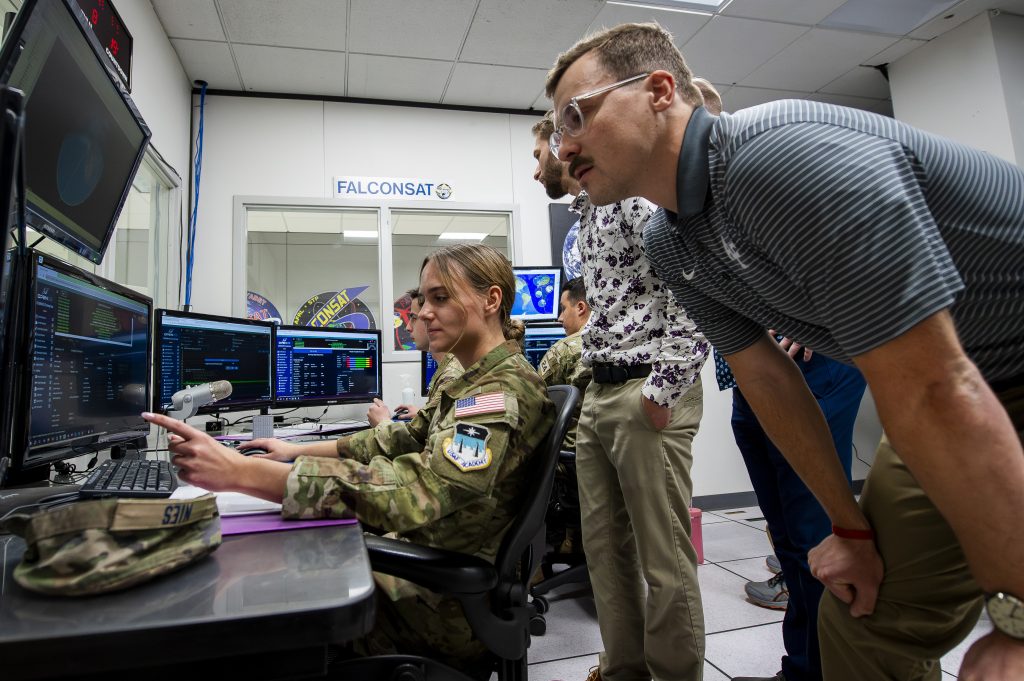When a SpaceX Falcon 9 rocket lifted off from Vandenberg Space Force Base, Calif., Nov. 11, among the more than 100 satellites it launched into orbit was one designed, built, and operated by Air Force Academy cadets.
The FalconSAT-X, a project that began with the class of 2019, is the latest in a series of small satellites developed by USAFA cadets over the past two decades. at the U.S. Air Force Academy. The FalconSAT program continues to give future Air Force and Space Force officers firsthand experience in space operations.
“We primarily build upon the work of years past, and a lot of what we have been working with is as a direct result of those who have come before us,” said Cadet 1st Class Casey Dutro told Air & Space Forces Magazine.
For the class of 2024, much of the work this fall has focused on finalizing plans and honing the operational procedures for the satellite. The Cadet Space Operations Squadron, which draws members from all classes at the Academy, are responsible for the day-to-day operations of the FalconSAT satellites, which include FalconSAT-6 and FalconSAT-8, launched in 2018 and 2020, respectively.
“We were talking a lot about training, not only training ourselves to be able to run the passes, but we trained about 50 other operators to be able to operate on the satellite as well,” said Cadet 1st Class Parker Brush. “So that way when we’re not in the room, we also train them to be able to do passes as well. So in the weeks leading up to it, it was training a bunch of people on how to commission the satellite, and not only how to commission but how to operate it.”
When it came time for liftoff, the cadets were ready.
“The moment at launch, we got to watch it, enjoy ourselves, and then after about an hour and a half, we were making contact with the satellite,” Brush said. “It was very quick. We immediately ran down and started getting everything ready so we could talk to the satellite.”

Still, amid the quick turnaround, the students were able to take a moment to soak in their accomplishment.
“As someone who’s been fortunate enough to see a couple of launches in my life, this one was extraordinarily special,” said Cadet 1st Class John Olson. “Being able to actually have worked on the satellite itself and see it go up, there’s a sense of pride and accomplishment in looking at things that we’re trying to do with it. From that perspective, we’re really excited to move forward.”
The satellite hosts a number of technology experiments, including some related to propulsion and communications, noted Lt. Col. Daniel Showalter, director of the Space Systems Research Center at USAFA.
In addition to continued work with FalconSAT-X, the program has already started work on its successor, FalconSAT-Xtra. For the class of 2024, the rest of the year will be focused on ensuring both the new satellite in orbit and the one in development are ready to be handed off.
“Our big goal is to be able to set up FalconSAT-X so that we can hand it off to the next group,” Brush said. “So setting up data analysis processes and setting up common procedures for passes and operations so that way, once we’re gone … everything is fully prepared for the next class to take it on and make it better than what we had.”
From there, some of the cadets will embark on careers in the Space Force with the invaluable experience of having already dipped their toes in space operations.
“Actually working on the satellite and looking at the different processes and things that are going on, I garnered a greater appreciation for the systems engineering and the thought process behind putting everything together,” said Olson, who hopes to be an engineer in the USSF.
Others will move on to the Air Force—but with a greater appreciation for space.
“It definitely gives you more insight into all of the work that goes into stuff that we take for granted today such as GPS,” said Brush, who hopes to become a pilot. “Every single plane in our inventory relies upon GPS, and all of that comes from satellites. So all of the work that I’m going to be able to do is so incredibly reliant upon all of the work that happens in space, and seeing what goes on down here, it gives me a sense of appreciation for what goes on.”
“It’s also given me a new look on the acquisition process and how that kind of looks, with the development of an idea to actual hardware, software going up,” added Dutro. “That process and seeing that has been phenomenal in terms of giving me that background knowledge.”
Such appreciation could help shape future Air Force and Space Force leaders’ views on space.
“Programs like FalconSat help our cadets learn how to leverage the vast potential of space power in the [future fight],” USAFA dean of faculty Brig. Gen. Linell Letendre posted on social media.